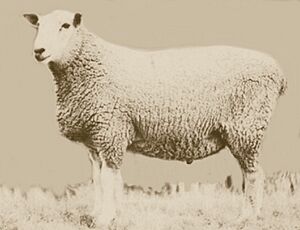Gromark facts for kids
The Gromark is a special type of sheep. It's a large sheep that gives us both meat and wool. These sheep were first developed in Australia in 1965. A farmer named Arthur C. Godlee started creating them. He wanted sheep that grew fast, had good wool, and produced healthy lambs.
What Makes Gromark Sheep Unique?
Gromark sheep are a mix of two other sheep breeds: Corriedale and Border Leicester. They don't have horns, which is called being "polled." They have white faces and clean legs.
Their wool is long and white. Each fleece can weigh between 4 and 7 kilograms. The wool fibers are about 130 millimeters long. They are also about 30 microns thick. A micron is a tiny unit of measurement, much smaller than a millimeter.
Male Gromark sheep, called rams, usually weigh around 100 kilograms. Female Gromark sheep, called ewes, weigh about 75 to 80 kilograms. Rams are often used to breed lambs for meat. The ewes also produce large, lean lambs.
Gromark sheep are very tough and healthy. They don't often get bothered by fly strike. This is a problem where flies lay eggs on sheep. They also have few problems giving birth, which is called dystocia.
The Story of Gromark Sheep
Since 1965, farmers have carefully chosen Gromark sheep for breeding. They use special measurements to pick sheep that grow well without too much fat. This helps make sure the breed stays strong and healthy.
These measurements also help improve something called "Estimated Breeding Values" (EBVs). EBVs are like a report card for animals. They show how good an animal's offspring might be. This helps farmers choose the best sheep for breeding.
In 1979, the Australian Gromark Breed Society was formed. This group helps keep track of how well Gromark sheep are doing. They make sure farmers continue to use good breeding practices.
Where Do Gromark Sheep Live?
You can mostly find Gromark sheep in areas with lots of rain. These areas are in south-east Australia. This includes parts of New South Wales and Victoria.
The Rare Breeds Trust of Australia is a group that looks after special animal breeds. They are studying Gromark sheep. They want to make sure the breed stays strong and healthy for the future.


